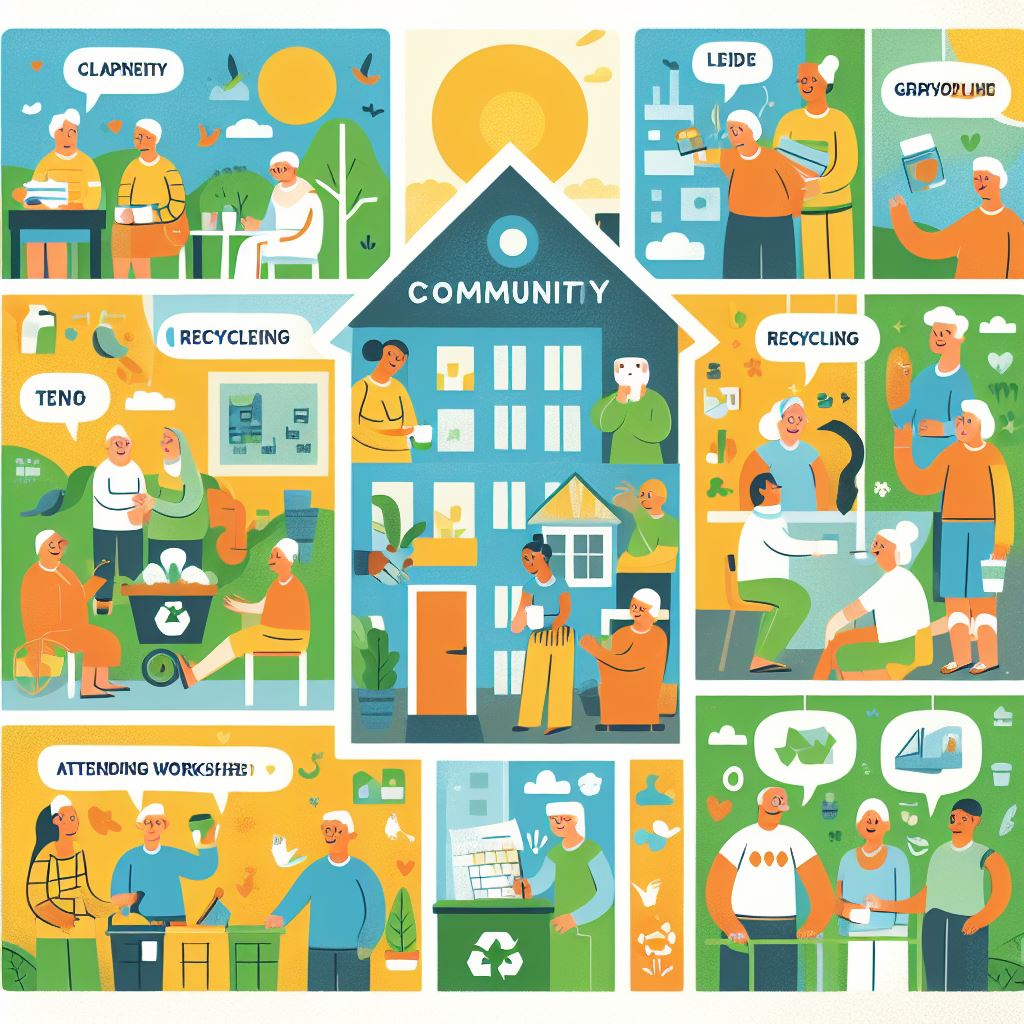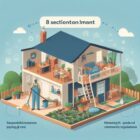Essential Duties of Tenants in Subsidized Housing

Imagine you’re on a journey, embarking on a new chapter of your life in subsidized housing. Just like a captain navigating their ship, you have a crucial role to play.
This article will serve as your compass, guiding you through the essential duties of tenants in subsidized housing. From complying with lease agreements to maintaining your living space, we’ll explore the guidelines and expectations that ensure a harmonious community.
Together, let’s navigate the waters of responsibility and advocate for the well-being of all residents.
Key Takeaways
- Compliance with lease agreement and program requirements is crucial for tenants in subsidized housing.
- Maintenance and cleanliness are important responsibilities for tenants to ensure a safe and secure living environment.
- Following community guidelines and practicing respectful interaction fosters harmony among residents.
- Reporting and resolving issues promptly and through proper channels is necessary to address any problems that may arise.
Compliance With Lease Agreement
As a tenant in subsidized housing, you must comply with the terms and conditions outlined in your lease agreement. This includes adhering to all rules and regulations set forth by the housing authority or property management company. By doing so, you not only fulfill your obligations as a tenant, but you also contribute to the overall well-being and harmony of the community.
Compliance with the lease agreement is crucial for several reasons. Firstly, it ensures that you’re aware of your rights and responsibilities as a tenant. The lease agreement serves as a legal document that protects both you and the property owner, providing a clear framework for your tenancy.
Secondly, complying with the lease agreement helps maintain a safe and secure living environment for everyone. By following the rules regarding noise levels, proper disposal of trash, and respecting common areas, you contribute to a peaceful and enjoyable community for all residents.
Furthermore, complying with the lease agreement is essential for the sustainability of subsidized housing programs. These programs aim to provide affordable housing options for individuals and families in need. By adhering to the terms and conditions, you demonstrate your commitment to the program and ensure its continued success. Non-compliance can jeopardize not only your own tenancy but also the availability of subsidized housing for others who may be in need.
Maintenance of Living Space
To ensure the proper maintenance of your living space in subsidized housing, it’s important that you regularly clean and repair any damages. Taking care of your living space not only promotes a healthy and comfortable environment for yourself, but also contributes to the overall well-being of the community.
Here are five key maintenance duties that you should prioritize:
- Cleaning: Keeping your living space clean is essential to prevent the buildup of dirt, dust, and pests. Regularly vacuuming, dusting, and mopping will help maintain a hygienic living environment.
- Repairs: Promptly addressing any damages or issues in your unit is crucial. Whether it’s a leaky faucet, a broken window, or a malfunctioning appliance, reporting and fixing these problems will prevent further damage and ensure your living space remains safe and functional.
- Pest Control: Taking preventive measures against pests, such as sealing cracks and keeping food properly stored, is important. If you encounter any pest infestations, report them immediately to your housing provider.
- Maintenance Requests: Communicating with your housing provider and promptly reporting any maintenance issues is essential. This allows them to address the problem in a timely manner and prevent it from escalating.
- Proper Waste Management: Disposing of trash and recyclables properly isn’t only important for maintaining a clean living space but also for the overall cleanliness and appearance of the community.
By fulfilling these maintenance duties, you contribute to the upkeep of your living space and help create a pleasant and safe environment for everyone.
In the next section, we’ll discuss the importance of adhering to community guidelines to foster a harmonious living environment.
Adherence to Community Guidelines
Follow community guidelines to ensure a harmonious living environment in subsidized housing. Adhering to these guidelines is crucial for creating a sense of unity and respect among residents. By following these rules, you contribute to the overall well-being of the community and help maintain a positive living experience for everyone involved.
Community guidelines often cover a range of topics, including noise levels, cleanliness, and respectful behavior. It’s important to familiarize yourself with these guidelines and ensure that you’re adhering to them at all times. By being mindful of your actions and how they may impact others, you can help create a peaceful and inclusive environment for everyone.
Respecting quiet hours is a key aspect of community guidelines. Being considerate of your neighbors by keeping noise levels to a minimum during designated quiet times, such as late evenings or early mornings, helps to ensure that everyone can enjoy a peaceful living space.
Additionally, maintaining cleanliness in shared areas, such as hallways or laundry rooms, is essential for creating a clean and inviting atmosphere for all residents.
Respectful Interaction With Neighbors
Following community guidelines also means engaging in respectful interactions with your neighbors in subsidized housing. By fostering a harmonious living environment, you contribute to the overall well-being of the community and create a sense of unity.
Here are some essential ways you can demonstrate respect towards your neighbors:
- Maintain Noise Levels: Be mindful of the noise you create, especially during quiet hours. Keep the volume of your TV, music, or conversations at a reasonable level to avoid disturbing others.
- Practice Good Hygiene: Properly dispose of trash, refrain from littering, and maintain cleanliness in shared spaces. This helps prevent odors and pests, creating a healthier living environment for everyone.
- Respect Boundaries: Be considerate of your neighbors’ personal space and property. Avoid trespassing, and be cautious of noise, smoke, or odors that may infiltrate their living areas.
- Be Mindful of Cultural Differences: Embrace the diversity within your community and be respectful of different cultural practices and traditions. Avoid making assumptions or stereotypes, and foster an inclusive environment.
- Resolve Conflicts Peacefully: If conflicts arise, approach your neighbors calmly and respectfully to discuss the issue and find a resolution. This can help prevent escalation and maintain a positive living environment.
By engaging in respectful interactions with your neighbors, you contribute to a cohesive and supportive community. This not only enhances your own living experience but also sets an example for others to follow.
Now, let’s move on to discussing the importance of promptly reporting maintenance issues.
Reporting of Maintenance Issues
As a tenant in subsidized housing, it is important that you promptly report any maintenance issues that arise. By promptly reporting these issues, you are not only ensuring your own comfort and safety but also helping to maintain the overall quality of the housing complex. The table below outlines the steps you should take when reporting maintenance issues:
| Step | Action |
|---|---|
| 1 | Contact the housing management office immediately. Provide them with a detailed description of the issue, including the location and severity. |
| 2 | Follow up with a written notice, either by email or letter, to document the issue and your request for repairs. Keep a copy for your records. |
| 3 | If the issue is not addressed within a reasonable timeframe, escalate your concerns in writing to the housing management office. Be sure to include the previous correspondence and any relevant photos or evidence. |
| 4 | If the issue still remains unresolved, contact the local housing authority or tenant advocacy organization for further assistance and guidance. They can help advocate for your rights as a tenant. |
| 5 | Maintain open communication with the housing management office throughout the process, providing updates and requesting status reports until the issue is resolved. |
Frequently Asked Questions
Can Tenants in Subsidized Housing Have Pets?
Yes, tenants in subsidized housing can have pets. However, there may be certain rules and restrictions that you need to follow, such as obtaining permission, paying additional fees, and adhering to pet-related regulations.
Are Tenants Responsible for Paying for Repairs and Maintenance in Their Living Space?
You are responsible for paying for repairs and maintenance in your living space in subsidized housing. This ensures the upkeep and safety of the property while also fostering a sense of pride and ownership.
Is There a Limit on the Number of Guests a Tenant Can Have in Their Subsidized Housing Unit?
Yes, there is a limit on the number of guests you can have in your subsidized housing unit. It is important to abide by these rules to maintain a fair and safe living environment for all residents.
What Happens if a Tenant Violates Community Guidelines in Subsidized Housing?
If you violate community guidelines in subsidized housing, consequences may include warnings, fines, or even eviction. It is important to familiarize yourself with the guidelines and adhere to them to maintain a positive living environment for all.
How Quickly Are Maintenance Issues Addressed in Subsidized Housing?
Maintenance issues in subsidized housing are typically addressed within 48 hours. As a tenant, you play a crucial role in promptly reporting any problems to your landlord or property management, ensuring a safe and comfortable living environment for all.



